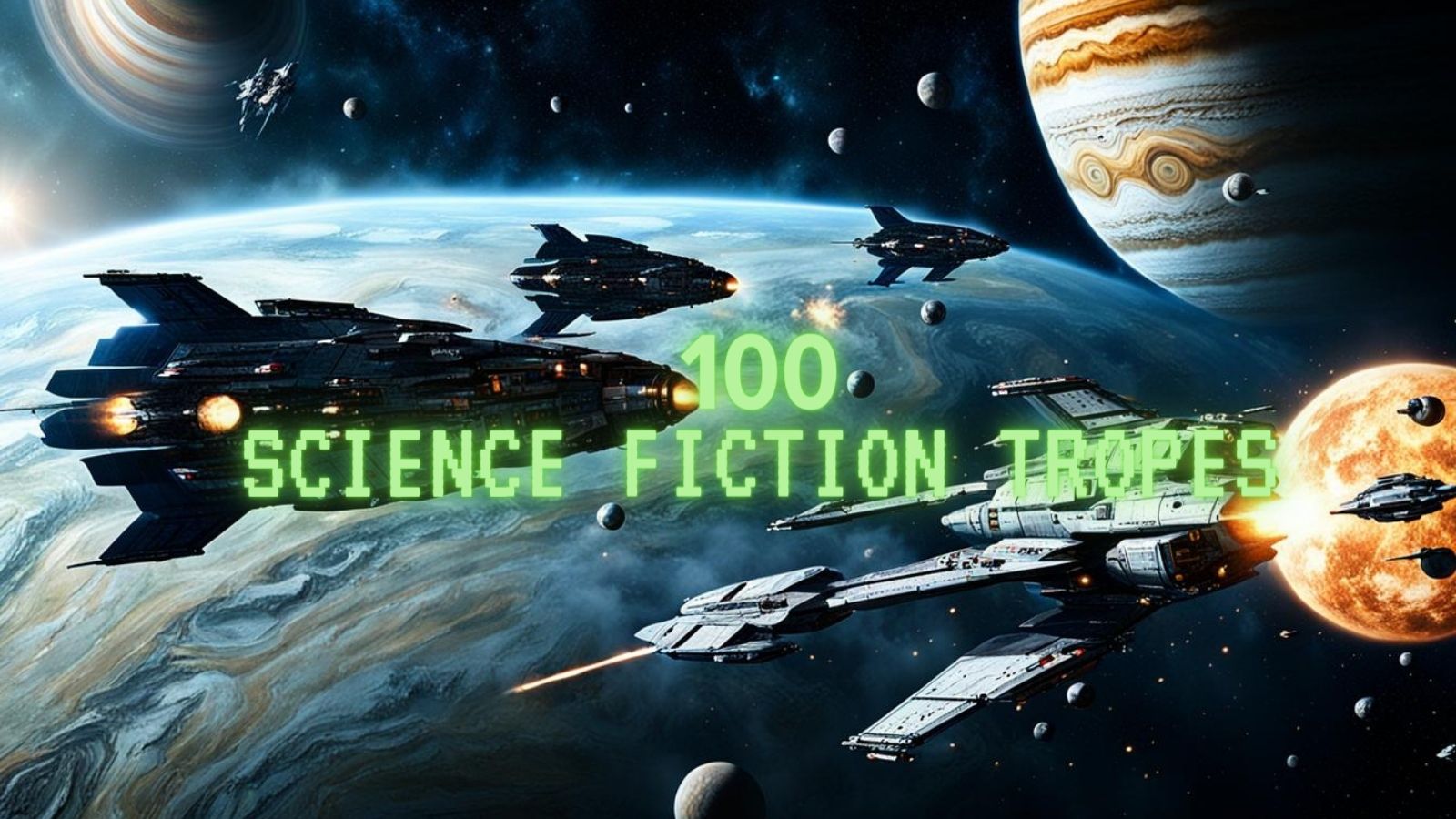
Here are 100 science fiction tropes: Science fiction is a genre that has captured the imagination of readers and viewers for generations. With its endless possibilities and limitless creativity, it’s no wonder that certain themes, ideas, and conventions have emerged over time, becoming the tropes we know and love today. In this article, we’ll explore 100 science fiction tropes that have become staples of the genre, from alien invasions to time travel and everything in between.
Science fiction tropes are more than just clichés or overused ideas. They are the building blocks of the genre, the familiar elements that readers and viewers expect to see in their favorite stories. These tropes have evolved over time, shaped by the works of influential writers and filmmakers, and have become an integral part of the science fiction landscape.
Some science fiction tropes are rooted in scientific concepts and theories, such as faster-than-light travel, parallel universes, and artificial intelligence. Others are more fantastical, such as psionic powers, shapeshifting, and time loops. Regardless of their basis in reality, these tropes allow writers to explore complex ideas and themes in a way that is both entertaining and thought-provoking.
Many science fiction tropes have become so ingrained in popular culture that they have transcended the genre and become part of our everyday language. Terms like “warp drive,” “teleportation,” and “cyborg” have entered the mainstream lexicon, and concepts like virtual reality and nanotechnology have become the subject of serious scientific research.
In the following list, we’ll delve into 100 science fiction tropes, providing a brief explanation of each one. From the classic to the obscure, these tropes demonstrate the incredible diversity and creativity of the science fiction genre. Whether you’re a die-hard fan or a casual reader, this list is sure to remind you of the many reasons why science fiction continues to captivate and inspire us.
Here are 100 science fiction tropes:
- Alien Invasion: Extraterrestrial beings attempt to conquer Earth.
- Alternate History: The story takes place in a world where historical events unfolded differently.
- Androids: Artificial beings that look and act like humans.
- Artificial Intelligence: Intelligent machines that can think and learn.
- Augmented Reality: The real world is enhanced with digital information.
- Bionics: Living organisms are enhanced with mechanical or electronic parts.
- Brain Uploading: Transferring human consciousness into a computer.
- Cloning: Creating genetically identical copies of organisms.
- Colonization of Other Planets: Humans establish settlements on other planets.
- Cryonics: Freezing people for later revival.
- Cybernetics: Enhancing the human body with machinery.
- Cyberpunk: A subgenre featuring advanced technology and social decay.
- Cyborgs: Beings with both organic and mechanical parts.
- Dystopia: A society characterized by oppression, suffering, or injustice.
- Faster-than-Light Travel: Spaceships that can travel faster than the speed of light.
- First Contact: The first encounter between humans and extraterrestrial life.
- Force Fields: Energy barriers that can protect or contain objects.
- Galactic Empire: A government that spans across multiple star systems.
- Generation Ships: Spaceships designed to support multiple generations during long voyages.
- Genetic Engineering: Modifying the DNA of living organisms.
- Hive Mind: A collective consciousness shared by multiple individuals.
- Holography: Creating three-dimensional images using light.
- Human Enhancement: Improving human abilities through technology.
- Hyperspace: A theoretical space used for faster-than-light travel.
- Immortality: The ability to live forever.
- Interplanetary War: Conflict between planets or inhabitants of different planets.
- Interstellar Travel: Traveling between star systems.
- Invisibility: The ability to become invisible.
- Laser Weapons: Weapons that emit concentrated beams of light.
- Matrix-like Virtual Reality: A simulated reality indistinguishable from the real world.
- Mecha: Giant robotic machines, often piloted by humans.
- Memory Manipulation: The ability to alter, erase, or implant memories.
- Mind Control: The ability to control the thoughts and actions of others.
- Mind Uploading: Transferring a person’s mind into a computer or artificial body.
- Mutants: Beings with genetic mutations that grant them special abilities.
- Nanotechnology: Manipulating matter at the atomic or molecular level.
- Neural Implants: Devices implanted in the brain to enhance or modify brain function.
- Parallel Universes: Separate universes that exist simultaneously.
- Plasma Weapons: Weapons that use superheated, ionized gas.
- Pocket Dimensions: Small, self-contained universes.
- Post-Apocalyptic World: A setting after a global catastrophe.
- Precognition: The ability to perceive future events.
- Psionic Powers: Mental abilities such as telepathy or telekinesis.
- Rayguns: Directed-energy weapons that emit rays or beams.
- Regeneration: The ability to heal rapidly from injuries.
- Replicators: Machines that can create any object from raw materials.
- Resurrection: Bringing the dead back to life.
- Robotic Uprising: Robots rebelling against their human creators.
- Rogue AI: An artificial intelligence that becomes uncontrollable or hostile.
- Shapeshifting: The ability to change one’s physical form.
- Singularity: A point in the future when technological growth becomes uncontrollable and irreversible.
- Sleeper Ships: Spaceships where the crew is put into hibernation for long voyages.
- Space Elevators: Structures that transport people and cargo from a planet’s surface into space.
- Space Opera: A subgenre featuring adventures in space, often with melodramatic elements.
- Space Stations: Structures in space used for research, habitation, or as a waypoint for space travel.
- Spaceships: Vehicles designed for travel in space.
- Steampunk: A subgenre featuring advanced machines powered by steam in a historical setting.
- Subspace Communication: Instant communication across vast distances.
- Super Soldiers: Genetically enhanced or technologically augmented soldiers.
- Superhuman Abilities: Powers that exceed normal human capabilities.
- Suspended Animation: A state of slowed or halted biological function.
- Synthetic Lifeforms: Artificially created life, such as androids or genetically engineered beings.
- Telekinesis: The ability to move objects with the mind.
- Telepathy: The ability to read or communicate thoughts.
- Teleportation: Instantaneous transportation from one location to another.
- Terraforming: Modifying a planet’s environment to make it habitable for Earth-like life.
- Time Dilation: The slowing of time due to relativistic effects.
- Time Loop: A period of time that repeats itself.
- Time Paradox: A contradiction arising from time travel.
- Time Travel: The ability to travel to the past or future.
- Tractor Beams: Beams of energy that can push or pull objects.
- Transhumanism: The belief in enhancing the human condition through technology.
- Utopia: An ideal society, often achieved through advanced technology.
- Virtual Reality: A simulated environment that can be interacted with.
- Warp Drive: A faster-than-light propulsion system.
- Wormholes: Theoretical tunnels through space-time that connect distant points.
- Zero-G: The absence of gravity, often in space.
- Alien Language: Complex, often unintelligible languages spoken by extraterrestrial beings.
- Alien Artifacts: Objects of extraterrestrial origin with advanced technology.
- Alien Abduction: The kidnapping of humans by extraterrestrial beings.
- Alien Pet: An extraterrestrial creature kept as a companion.
- Alien Invasion: Extraterrestrial beings attempting to conquer Earth.
- Alien Hybrid: A being that is part human, part alien.
- Alien Diplomacy: Negotiations or relations between humans and extraterrestrial civilizations.
- Alien Conspiracy: A secret plot involving extraterrestrial influence on human affairs.
- Alien Bounty Hunter: An extraterrestrial who tracks down and captures targets for a reward.
- Alien Parasite: An extraterrestrial organism that lives on or in a host, often with detrimental effects.
- Alien Refuge: Earth serving as a sanctuary for extraterrestrial beings.
- Alien Technology: Advanced technology of extraterrestrial origin.
- Alien Invasion Aftermath: The consequences and rebuilding after an extraterrestrial attack.
- Alien Zoo: A collection of extraterrestrial creatures held in captivity.
- Alien Gladiators: Extraterrestrial beings forced to fight for entertainment.
- Alien Archeology: The study of ancient extraterrestrial civilizations and artifacts.
- Alien Shapeshifters: Extraterrestrial beings capable of altering their physical form.
- Alien Slave Trade: The trafficking of extraterrestrial beings as a commodity.
- Alien Invasion Resistance: Human efforts to fight against an extraterrestrial occupation.
- Alien Messiah: An extraterrestrial being seen as a savior or religious figure.
- Alien Xenoforming: Extraterrestrial efforts to alter Earth’s environment to suit their needs.
- Alien Sleeper Agents: Extraterrestrial beings living among humans, waiting to be activated for a mission.
- Alien Prophecy: A prediction or legend from an extraterrestrial culture that affects human events.
As we’ve seen throughout this list, science fiction tropes have played a significant role in shaping the genre and influencing popular culture. From the classic tales of alien invasions and robotic uprisings to the more recent explorations of virtual reality and transhumanism, these tropes have provided a framework for writers and filmmakers to explore complex ideas and push the boundaries of our imagination.
However, it’s important to remember that tropes are not a substitute for originality or creativity. While they can provide a familiar starting point for a story, the best science fiction works are those that take these tropes and subvert them, twist them, or use them in new and unexpected ways. By doing so, writers can create stories that are both recognizable and fresh, tapping into the collective unconscious while still surprising and delighting their audience.
Moreover, as our understanding of science and technology continues to evolve, so too will the tropes of science fiction. What may have seemed like pure fantasy a century ago, such as space travel or artificial intelligence, is now a reality. As we push forward into uncharted territory, both in the real world and in the realm of imagination, we can expect to see new tropes emerge, reflecting our hopes, fears, and aspirations for the future.
In the end, science fiction tropes are a testament to the enduring power of storytelling. They remind us that even in a genre that is ostensibly about the future, it is the human experience that lies at the heart of every great story. Whether we’re exploring the stars, battling alien invaders, or grappling with the implications of new technologies, science fiction tropes provide a lens through which we can examine ourselves and our place in the universe.
So the next time you encounter a science fiction trope, whether in a book, a movie, or a TV show, take a moment to appreciate the legacy of the genre and the countless writers and filmmakers who have contributed to its evolution. And remember that even the most familiar tropes can be made new again in the hands of a skilled storyteller, reminding us once again why science fiction continues to be one of the most exciting and enduring genres of all time. If you enjoyed these tropes, we have many more on our site.
- 100 Screenwriting Ideas to Get You Writing - January 20, 2026
- 100 Winter Storm Writing Prompts - January 17, 2026
- 100 Haunted House Story Starters: Craft Your Scariest Tale Yet - January 10, 2026




Bionics, cybernetics, cyborgs… all the same thing, making three repeats by #13… so, like 30 unique tropes?